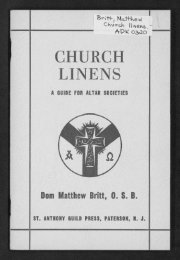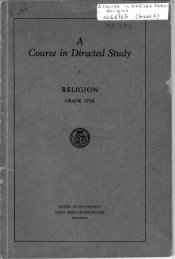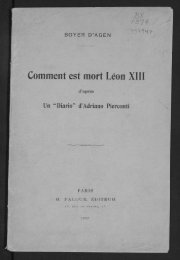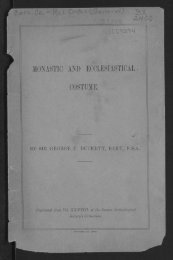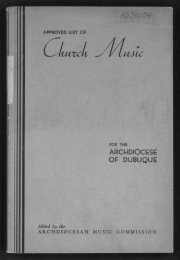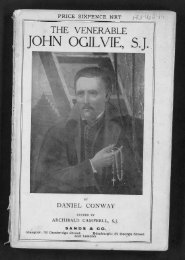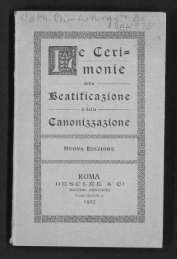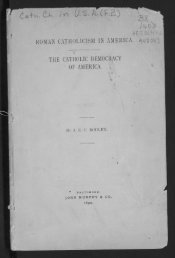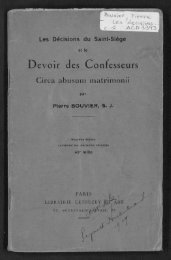Fabiola : or, The church of the catacombs - Digital Repository Services
Fabiola : or, The church of the catacombs - Digital Repository Services
Fabiola : or, The church of the catacombs - Digital Repository Services
Create successful ePaper yourself
Turn your PDF publications into a flip-book with our unique Google optimized e-Paper software.
eight years.<br />
n i money.<br />
<strong>The</strong> provincial towns, as Dio Cassius remarks, and<br />
ularly Smyrna, that had ju.st risen from its ashes, -were richly<br />
"<br />
l>y <strong>the</strong> Emper<strong>or</strong>. Through such munificence, <strong>the</strong> c<strong>of</strong>fers<br />
.rcus Aurelius were so much exhausted, that at lost he had<br />
He <strong>the</strong>ref<strong>or</strong>e put up his imperial jewels, his plate,<br />
:iini even Faustina's jewels and wardrobe f<strong>or</strong> public sale.<br />
Inasmuch as Marcus Aurelius gained <strong>the</strong> fav<strong>or</strong> <strong>of</strong> his people,<br />
by his generosity, and as much as he lab<strong>or</strong>ed to establish his dignity,<br />
so much <strong>the</strong> m<strong>or</strong>e was Commodus hated by <strong>the</strong>m: so that<br />
all <strong>the</strong> intentions and lab<strong>or</strong>s <strong>of</strong> <strong>the</strong> noble fa<strong>the</strong>r were wrecked on<br />
<strong>the</strong> w<strong>or</strong>thlessness <strong>of</strong> <strong>the</strong> son. He was wanton, cruel, unjust, and<br />
rapacious, and in every respect b<strong>or</strong>e a striking resemblance to<br />
his tyrannical and depraved predecess<strong>or</strong>, Domitian, and his greatest<br />
ambition was to be styled: "<strong>The</strong> conquer<strong>or</strong> <strong>of</strong> a thousand<br />
gladiat<strong>or</strong>s." Commodus' wicked career was terminated by a sud-<br />
den and violent death, in <strong>the</strong> thirty-first year <strong>of</strong> his age ,<br />
reign <strong>of</strong> thirteen yours.<br />
CHAPTER XX.<br />
1.YDIA IN SEARCH OF HER MOTHER.<br />
after a<br />
LociAir remarked once in speaking <strong>of</strong> <strong>the</strong> Christians; "It is<br />
scarcely to be believed, how <strong>the</strong>se men, so indifferent to <strong>the</strong> du-<br />
ties <strong>of</strong> <strong>the</strong> state, can run, <strong>the</strong> moment <strong>the</strong> neck <strong>of</strong> one <strong>of</strong> <strong>the</strong>ir<br />
own sect is in danger; <strong>the</strong>y assemble toge<strong>the</strong>r like ants to save<br />
him. <strong>The</strong>y are persuaded that <strong>the</strong>y are imm<strong>or</strong>tal in soul and<br />
body, and are taught to believe that <strong>the</strong>y are all bro<strong>the</strong>rs."<br />
How could it be difficult under such circumstance f<strong>or</strong> one <strong>of</strong><br />
thoir faith, entering <strong>the</strong> imperial city as a stranger, to find a hos-<br />
pitable reception with sympathizing bro<strong>the</strong>rs.<br />
Even as it is to this day, where <strong>the</strong> members <strong>of</strong> that commu-<br />
nity settle <strong>the</strong>mselves near <strong>the</strong> <strong>church</strong>, so we find that <strong>the</strong> Christians<br />
<strong>of</strong> that time placed <strong>the</strong>mselves near <strong>the</strong> sanctuary, and that<br />
too on <strong>the</strong> east side <strong>of</strong> <strong>the</strong> city.<br />
<strong>The</strong> Viminal Hill could perhaps be called tho first spot where<br />
a colony <strong>of</strong> Christians settled. "Already in <strong>the</strong> time <strong>of</strong> <strong>the</strong><br />
Apostles <strong>the</strong>re were in Rome, places consecrated to God ; by some<br />
called <strong>or</strong>at<strong>or</strong>ies, by o<strong>the</strong>rs <strong>church</strong>es, where, on every first day <strong>of</strong><br />
<strong>the</strong> week, a meeting took place, and <strong>the</strong> Christians who prayed<br />
<strong>the</strong>re, heard <strong>the</strong> w<strong>or</strong>d <strong>of</strong> God, and received Communion."*<br />
At <strong>the</strong> foot <strong>of</strong> <strong>the</strong> Viminal, stood <strong>the</strong> <strong>church</strong>, called <strong>the</strong><br />
"Church <strong>of</strong> <strong>the</strong> Shepherd." In this <strong>church</strong>, which was afterwards<br />
called St. Pudentiana, St. Peter had <strong>of</strong>ficiated a hundred<br />
years previous, and <strong>the</strong>re celebrated <strong>the</strong> sacred mysteries. 8 8.<br />
Peter and Paul, during <strong>the</strong>ir sojourn in Rome, converted to Christianity<br />
<strong>the</strong> Senat<strong>or</strong> Pudens and his daughters, and those two<br />
daughters, Pudentiana and Praxedes, who clung to <strong>the</strong> Faith<br />
with a holy zeal, appropriated, not only <strong>the</strong>ir dwelling places, but<br />
(he entire <strong>of</strong> <strong>the</strong>ir f<strong>or</strong>tunes to religious purposes.<br />
At .this day, eighteen hundred years later, strangers find in<br />
Rome, not far from <strong>the</strong> famous Bazilica <strong>of</strong> S. Maria Maggi<strong>or</strong>e,<br />
two <strong>church</strong>es called St. Pudentiana and St. Praxedes.<br />
Although Lydia was a stranger in Rome, still she found in<br />
<strong>the</strong> above mentioned <strong>or</strong>at<strong>or</strong>ies several Christians, who with <strong>the</strong><br />
greatest kindness assured her <strong>of</strong> <strong>the</strong>ir services, f<strong>or</strong> <strong>the</strong>y were at<br />
that time as in <strong>the</strong> Apostles; "One heart and one soul." She<br />
hastened to impart to her first acquaintance, how her mo<strong>the</strong>r<br />
had been t<strong>or</strong>n from her several years back, at Smyrna, that she<br />
was a Christian, and her name Charitana, and that she was<br />
probably a slave in Rome. <strong>The</strong> number <strong>of</strong> <strong>the</strong> Christians<br />
was <strong>the</strong>n so great, that it would have been difficult in so large a<br />
c'ty, to find a slave, who had in all probability changed her f<strong>or</strong>mer<br />
name. Besides <strong>the</strong> rich families were, f<strong>or</strong> <strong>the</strong> most part, in<br />
t he country during <strong>the</strong> summer months, seeking change<br />
<strong>of</strong> air<br />
ei<strong>the</strong>r in <strong>the</strong> mountains <strong>or</strong> at <strong>the</strong> sea-side, where <strong>the</strong>y were at<br />
nl by <strong>the</strong> greater number <strong>of</strong> <strong>the</strong>ir domestics.<br />
Lydia resolved to remain in Rome, and to seek her mo<strong>the</strong>r un<br />
ee is-in-.rly until she had found her, <strong>or</strong> till she had received cer-<br />
tain news <strong>of</strong> her fate.<br />
i'(. Proi>riiini Sanct<strong>or</strong>um In dcdlcul. JJusil as. tMmimuiB.<br />
She was told that in a few days <strong>the</strong> feast <strong>of</strong> St. Mar<br />
would bo celebrated, and that f<strong>or</strong> this purpose, many <strong>of</strong> tho<br />
Christians would assemble in <strong>the</strong> Catacombs near <strong>the</strong><br />
Way, f<strong>or</strong> divine service, and that she would probably U<br />
ccive m<strong>or</strong>e certain news <strong>of</strong> Charitana.<br />
At <strong>the</strong>se w<strong>or</strong>ds Lydia's countenance brightened, and si.<br />
herself <strong>the</strong> happiest <strong>of</strong> m<strong>or</strong>tals, and imagined herself already<br />
in <strong>the</strong> embraces <strong>of</strong> her dear mo<strong>the</strong>r, from whom she hud 1<br />
long separated. This hope did not deter her from making in-<br />
quiries <strong>of</strong> all <strong>the</strong> Christians she met, asking <strong>the</strong>m if 1, <strong>the</strong>y<br />
<strong>or</strong> heard anything <strong>of</strong> Charitana. She went first <strong>of</strong> all to u pious<br />
and wealthy matron, named Fchcitas, to whom she was recommended<br />
by Bishop Dionysms, and was received by her as if hc<br />
had belonged to <strong>the</strong> renowned family <strong>of</strong> this much-tried woman.<br />
<strong>The</strong> circumstance that she was <strong>the</strong> daughter <strong>of</strong> one sold on account<br />
<strong>of</strong> her Faith, was a sufficient recommendation. Felicitas<br />
promised that she would introduce her to <strong>the</strong> Roman Bishop,<br />
Holer, at <strong>the</strong> next meeting <strong>of</strong> <strong>the</strong> faithful, and added that per-<br />
haps he could give her some intelligence.<br />
We will now accompany <strong>the</strong> Christians to <strong>the</strong> nightly meeting,<br />
which on <strong>the</strong> above named day took place in <strong>the</strong> Catacombs m<br />
<strong>the</strong> Appian Way. It is two hours past midnight, and Rome is<br />
sunk in sleep, but here and <strong>the</strong>re can be seen a straggler who<br />
had been tempted to linger with his dissolute companions, far<br />
beyond <strong>the</strong> hour prescribed by usage. Aproaching footsteps<br />
echoed along <strong>the</strong> deserted streets, and some females from <strong>the</strong><br />
house <strong>of</strong> a wealthy Roman solicit<strong>or</strong>, Minutius Felix, were wending<br />
<strong>the</strong>ir way in pr<strong>of</strong>ound silence along <strong>the</strong> Esquilme hill, and<br />
passed <strong>the</strong> Coliseum. This gigantic structure, erected by <strong>or</strong>der<br />
<strong>of</strong> Vespasian, is said to have been built in one year, by <strong>the</strong> f<strong>or</strong>ced<br />
lab<strong>or</strong> <strong>of</strong> 12,000 Jews and Christians. It consisted <strong>of</strong> three <strong>or</strong>ders<br />
<strong>of</strong> architecture, <strong>the</strong> D<strong>or</strong>ic, Ionic, and C<strong>or</strong>inthian, and was six-<br />
teen hundred and twelve feet in circumference. It contained<br />
eighty arcades, and was capable <strong>of</strong> accommodating a hundred<br />
thousand spectat<strong>or</strong>s. <strong>The</strong>ir road led to <strong>the</strong> new and extensive<br />
baths built by Antoninus, and <strong>the</strong>n across to <strong>the</strong> Via Appia towards<br />
<strong>the</strong> Almo river. <strong>The</strong> females to <strong>the</strong> left, advanced towards<br />
some villas m <strong>the</strong> valley <strong>of</strong> Egeria, where were some monuments<br />
to <strong>the</strong> departed Romans, and a temple to <strong>the</strong> Deus Ridiculus.<br />
<strong>The</strong> pious company had not yet reached <strong>the</strong> Catacombs, when<br />
Lydia interrupted <strong>the</strong> long silence <strong>of</strong> her companions by remark-<br />
"<br />
ing: I wonder If I shall see my mo<strong>the</strong>r again in this w<strong>or</strong>ld!<br />
How that I expect to hear something <strong>of</strong> her, I feel myself oppressed<br />
with an unusual heaviness and anxious s<strong>or</strong>row. Our<br />
wandering here in <strong>the</strong> first dawn <strong>of</strong> m<strong>or</strong>ning, as well ns I tie<br />
tombs here in <strong>the</strong> Appian Way, yes <strong>the</strong> mem<strong>or</strong>y <strong>of</strong> <strong>the</strong> saint her<br />
self, whose feast we are going to celebrate all remind mo <strong>of</strong> <strong>the</strong><br />
journey <strong>of</strong> those holy women, who bef<strong>or</strong>e it was yet day, de-<br />
parted from Jerusalem to visit <strong>the</strong> sepulchre <strong>of</strong> our Redeemer.<br />
Perhaps our way will also lead to a grave."<br />
"Why such melancholy thoughts," interrupted Felicitas,<br />
" remember that Magdalen found Him living, whom she sought<br />
in <strong>the</strong> grave. We are also going to <strong>the</strong> graves <strong>of</strong> <strong>the</strong> saints. \\ ho<br />
lie in <strong>the</strong> Catacombs, and perhaps you will find her whom you<br />
seek amongst <strong>the</strong> dead, also living." <strong>The</strong> nearer she appr<br />
<strong>the</strong> entrance, <strong>the</strong> m<strong>or</strong>e animated became <strong>the</strong> streets which led to<br />
<strong>the</strong> subterraneous <strong>church</strong>es. Christians from all parts were assembling<br />
at that early hour to join in <strong>the</strong> solemn service. <strong>The</strong><br />
women passed through a do<strong>or</strong> to <strong>the</strong> subterraneous streets anil to<br />
<strong>the</strong> last resting places <strong>of</strong> so many thousands <strong>of</strong> <strong>the</strong> faithful<br />
parted. A youth was keeping a careful watch at th<br />
de-<br />
<strong>of</strong>fered <strong>the</strong>m a taper. <strong>The</strong> air was thick and oppiv-<br />
<strong>the</strong> heat <strong>of</strong> summer did not tend to lessen, and <strong>the</strong> M,<br />
mouldering bodies was scarcely to be b<strong>or</strong>ne. <strong>The</strong> grey walls<br />
<strong>of</strong> <strong>the</strong> alternately small and large passages, which ci<br />
o<strong>the</strong>r a hundred times, were full <strong>of</strong> apertures in <strong>the</strong> f<strong>or</strong>m



